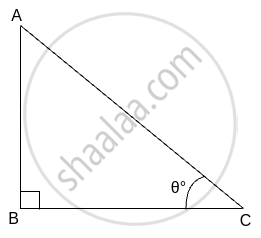Advertisements
Advertisements
Question
`(tan^2theta)/((1+ tan^2 theta))+ cot^2 theta/((1+ cot^2 theta))=1`
Solution
LHS = `(tan^2theta)/((1+ tan^2 theta))+ cot^2 theta/((1+ cot^2 theta))`
=`tan^2 theta/sec^2 theta + cot^2 theta/ cosec ^2 theta (∵ sec^2 theta - tan^2 theta = 1 and cosec^2 theta - cot^2 theta=1)`
=`(sin^2theta/cos^2 theta)/(1/cos^2theta) + (cos^2theta/sin^2 theta)/(1/sin^2 theta)`
=` sin^2 theta + cos^2 theta`
=1
= RHS
Hence, LHS = RHS
APPEARS IN
RELATED QUESTIONS
Prove the following trigonometric identities.
sec A (1 − sin A) (sec A + tan A) = 1
Prove the following trigonometric identities. `(1 - cos A)/(1 + cos A) = (cot A - cosec A)^2`
Prove that: `sqrt((sec theta - 1)/(sec theta + 1)) + sqrt((sec theta + 1)/(sec theta - 1)) = 2 cosec theta`
Prove the following identities:
cosec A(1 + cos A) (cosec A – cot A) = 1
Prove the following identities:
`(1 - cosA)/sinA + sinA/(1 - cosA)= 2cosecA`
`cos^2 theta + 1/((1+ cot^2 theta )) =1`
`cos^2 theta /((1 tan theta))+ sin ^3 theta/((sin theta - cos theta))=(1+sin theta cos theta)`
Prove the following identity :
`(1 - sin^2θ)sec^2θ = 1`
Prove the following identity :
`(tanθ + 1/cosθ)^2 + (tanθ - 1/cosθ)^2 = 2((1 + sin^2θ)/(1 - sin^2θ))`
If tan θ = 2, where θ is an acute angle, find the value of cos θ.
Prove that `cos θ/sin(90° - θ) + sin θ/cos (90° - θ) = 2`.
Prove that: sin4 θ + cos4θ = 1 - 2sin2θ cos2 θ.
Prove that: `1/(sec θ - tan θ) = sec θ + tan θ`.
Prove the following identities.
tan4 θ + tan2 θ = sec4 θ – sec2 θ
If 5x = sec θ and `5/x` = tan θ, then `x^2 - 1/x^2` is equal to
Prove that `sqrt((1 + cos "A")/(1 - cos"A"))` = cosec A + cot A
Prove that
sin2A . tan A + cos2A . cot A + 2 sin A . cos A = tan A + cot A
If sin θ + cos θ = `sqrt(3)`, then show that tan θ + cot θ = 1
If a sinθ + b cosθ = c, then prove that a cosθ – b sinθ = `sqrt(a^2 + b^2 - c^2)`.
Find the value of sin2θ + cos2θ

Solution:
In Δ ABC, ∠ABC = 90°, ∠C = θ°
AB2 + BC2 = `square` .....(Pythagoras theorem)
Divide both sides by AC2
`"AB"^2/"AC"^2 + "BC"^2/"AC"^2 = "AC"^2/"AC"^2`
∴ `("AB"^2/"AC"^2) + ("BC"^2/"AC"^2) = 1`
But `"AB"/"AC" = square and "BC"/"AC" = square`
∴ `sin^2 theta + cos^2 theta = square`
